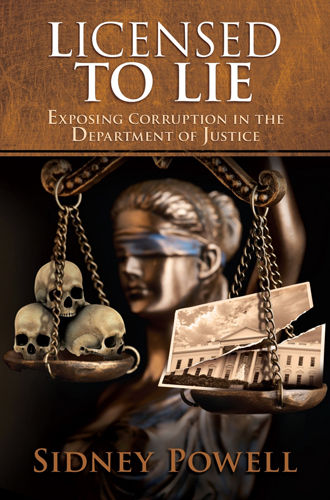Licensed to Lie by Sidney Powell
- Simian Practicalist
- Nov 7, 2021
- 4 min read
Updated: Jan 19, 2024
Licensed to Lie: Exposing Corruption in the Department of Justice by former federal prosecutor Sidney Powell reveals the systemic criminal misconduct of prosecutors who manipulate evidence in order to railroad defendants. The book was first published in 2014.

Most of the book is about the author’s own experience in dealing with the Merrill Lynch defendants, mostly Jim Brown, in the aftermath of the Enron collapse. To provide a context, the author does include some background leading up to the point at which she got more directly involved but much of it is her experience.
Despite the main text being over 400 pages, it is an easy read. The structure and the prose flow well. The layout is clean with good font size and the line spacing is generous. It is not heavy with the use of legal and technical language. If anything, there could be more of it.
In short, prosecutors are supposed to make available any potentially exculpatory material to the defense (Brady material). In the author’s experience, not only did they fail to do so but they also misrepresented or altered the evidence to fit their purposes, including to the jury. The charges were also false, based on an erroneous reading of the law in letter and in spirit. Add to those judges who were either half-asleep and unwilling to make rulings or conveniently way too trusting of prosecutors and a rigged system becomes the norm.
Whilst I am not surprised by any of this, what is particularly disturbing is that someone like Ms Powell, a lawyer of that caliber who was a federal prosecutor, seemed to be a little surprised by the persistent nonsense and the depth of the corruption she and her defendant faced. I suspect that even the least naive and most cynical individuals will have difficulty suppressing their anger when reading this.
Although the main text does not use the term “Deep State”, the blurb does. Maybe it was not the author’s intent at the time of writing but, given the players involved and their political connections, this book in hindsight can be read as providing a glimpse of one of the tentacles of the Deep State.
Below are a few points, not intended to be a summary.
The Enron Task Force (ETF)—which included Leslie Caldwell, Andrew Weissmann, Matthew Friedrich and Kathryn Ruemmler—indicted the entire Arthur Andersen accounting firm as opposed to the individuals who handled Enron files with the charge of obstruction of justice. This ended the 89-year-old firm.
Although the firm destroyed some documents before the subpoena, it retained hundreds of thousands of others that the prosecution did not allow the defense to introduce.
The prosecutors also convinced Judge Melinda Harmon to instruct the jury that Andersen could be guilty even without criminal intent.
Enron solicited Merrill Lynch into investing $7m in electrical barges and the two parties agreed to a standard contract after a phone conference. According to the prosecutors, the whole deal was a sham based on what was allegedly discussed even though Enron lost nothing and actually had made money on the deal.
Merrill Lynch executives, including managing director Jim Brown who personally warned against the deal, were convicted of conspiracy and wire fraud, amongst other things. There were no bribes or kickbacks. There was virtually no discovery process before trial and the prosecution released merely a few pages that inaccurately summarized the exculpatory material that proved the deal did not in fact break the law.
Witnesses who could testify in favor of the defense were threatened so that they would not testify.
The prosecutors convinced Judge Ewing Werlein to exclude “criminal intent” and include “understanding” in a broadened definition of conspiracy.
Later, the Supreme Court unanimously reversed the decision re Andersen. Despite reversals which acknowledged the prosecutorial nonsense and misconduct, ETF members were given awards. Some resigned for better jobs or failed upwards. Others took their place.
Three counts against Brown were reversed after he had served one year in prison. However, ETF pursued a retrial and there was still the issue of resentencing regarding counts four and five. Eventually, the prosecution provided the exculpatory material that showed they knew the truth that there was no wrongdoing regarding the barge case.
The author thought someone in power had to be pushing for a nonsensical retrial and suspected the errors that lead to the reversals to acting Assistant AG for the DOJ’s Criminal Division Matthew Friedrich.
In July 2008, Friedrich indicted Alaskan Senator Ted Stevens (R) on seven counts of failing to report alleged gifts on senate forms, four weeks before the Alaskan primary election and merely a few months before the presidential election.
Despite the farcical trial since it was clear that the prosecution knowingly hid evidence favorable to his defense, lead by Friedrich and Rita Glavin in the background, Stevens was found guilty.
Later, Judge Emmet Sullivan dismissed the indictment and, to his credit, ordered an investigation. This lead to Schuelke’s report.
On 9 August 2010, Stevens died in a plane crash that also killed four others. The circumstances of the crash remain a mystery. As pressure increased on the prosecutors’ conduct, one of the younger prosecutors who worked on the case, Nicholas Marsh, committed suicide on 26 September 2010.
Through the reversals of ETF prosecutions and the hearings related to the retrial of the Merrill Lynch defendants including Brown, more exculpatory evidence was made available. Fifteen hundred pages of documents showed that the prosecution not only highlighted exculpatory material and then knowingly withheld it but also made “surgical edits and alterations” to fit their objective.
It took nine years of going in circles—that is, the prosecutors repeating the same nonsensical argument and playing the intimation card, the defense repeating the same defense, judges who were either half-asleep or corruptly pro-government and who did not like to make rulings—Brown was finally resentenced to time served regarding counts four and five.
The prosecutors were reported to the bars but received no meaningful responses. The abovementioned highlighted material was never addressed and none of the mentioned prosecutors have been punished.
Be sure to subscribe to our mailing list so you get each new Opinyun that comes out!






Comments